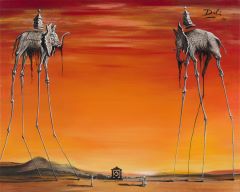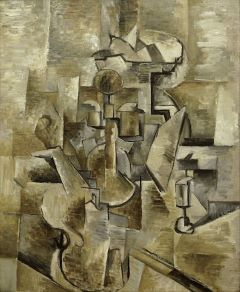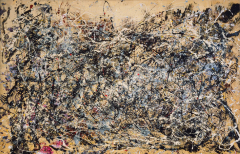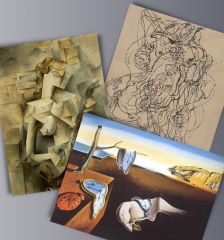| Art Movements and Their Impact: Exploring Surrealism, Cubism, and Abstract Expressionism |
 |
| Art movements have played a pivotal role in shaping the trajectory of artistic expression throughout history. From Surrealism's dreamlike landscapes to Cubism's fractured perspectives and Abstract Expressionism's emotive abstraction, these movements have left an indelible mark on the art world. In this article, we'll delve into the influential movements of Surrealism, Cubism, and Abstract Expressionism, examining their key characteristics, notable artists, and enduring impact on contemporary art.
|
| Surrealism |
 |
| Surrealism emerged in the early 20th century as a cultural and artistic movement aimed at exploring the realm of the subconscious mind. Led by AndreBreton, Surrealists sought to unlock the creative potential of the unconscious through spontaneous, irrational techniques. Surrealist artworks often feature bizarre juxtapositions, dreamlike imagery, and symbolic motifs.
Key Artists:
- Salvador Dali: Known for his melting clocks and enigmatic landscapes, Dali's work epitomizes the surreal aesthetic.
- Rene Magritte: Renowned for his thought-provoking paintings featuring ordinary objects in unexpected contexts, Magritte challenged conventional perceptions of reality.
- Max Ernst: Ernst experimented with collage, frottage, and grattage techniques to create haunting and otherworldly imagery.
Characteristics:
- Dreamlike imagery and fantastical landscapes.
- Symbolism and metaphorical motifs.
- Automatism and spontaneous creation.
- Exploration of the unconscious mind.
Influence on Contemporary Art:
The influence of Surrealism can be seen in contemporary art through the continued exploration of the subconscious, the use of unexpected juxtapositions, and the incorporation of dreamlike elements. Artists such as Yayoi Kusama, David Lynch, and Banksy have drawn inspiration from Surrealist principles in their work, pushing the boundaries of imagination and perception.
|

Salvador Dali

Rene Magritte
|
| Cubism |
 |
| Cubism revolutionized the art world in the early 20th century by breaking away from traditional notions of perspective and representation. Founded by Pablo Picasso and Georges Braque, Cubism sought to depict objects from multiple viewpoints simultaneously, fragmenting form and space into geometric shapes.
Key Artists:
- Pablo Picasso: A central figure in the Cubist movement, Picasso's innovative approach to form and composition redefined the possibilities of visual representation.
- Georges Braque: Braque collaborated closely with Picasso, developing the analytical phase of Cubism characterized by monochromatic palettes and intricate spatial arrangements.
- Juan Gris: Gris brought a sense of order and clarity to Cubist compositions through his meticulous attention to detail and refined color palette.
Characteristics:
- Fragmentation of form and space.
- Use of geometric shapes and angular lines.
- Multiple viewpoints and perspectives.
- Distortion and abstraction of subject matter.
Influence on Contemporary Art:
Cubism laid the groundwork for subsequent movements such as Constructivism, Futurism, and Abstract art. Its emphasis on abstraction, geometric structure, and conceptual complexity continues to inform contemporary art practices, from digital design to architectural innovation. Artists like Picasso himself, as well as contemporary figures such as Frank Stella and Gerhard Richter, have embraced Cubist principles in their work, pushing the boundaries of visual perception and representation.
|

Pablo Picasso

Georges Braque
|
| Abstract Expressionism |
 |
| Abstract Expressionism emerged in the mid-20th century as a response to the tumultuous social and political climate of the post-war era. Characterized by gestural brushwork, expressive abstraction, and a focus on the artist's emotional and psychological state, Abstract Expressionism prioritized individual expression and subjective experience.
Key Artists:
- Jackson Pollock: Renowned for his drip paintings, Pollock pioneered a radical form of gestural abstraction, allowing chance and spontaneity to guide his creative process.
- Willem de Kooning: Known for his dynamic and visceral canvases, de Kooning explored themes of figuration and abstraction, blurring the boundaries between the two.
- Mark Rothko: Rothko's iconic color field paintings evoke a profound sense of contemplation and transcendence, inviting viewers to immerse themselves in the emotive power of pure color and form.
Characteristics:
- Gestural brushwork and spontaneous mark-making.
- Emphasis on emotion, intuition, and subjective experience.
- Large-scale canvases and immersive environments.
- Exploration of color, form, and texture.
Influence on Contemporary Art:
Abstract Expressionism revolutionized the way artists approached the canvas, prioritizing individual expression and emotional authenticity over representational accuracy. Its legacy can be seen in contemporary practices such as Action Painting, Color Field painting, and Performance art. Artists like Cy Twombly, Helen Frankenthaler, and Joan Mitchell have extended the principles of Abstract Expressionism into new territories, continuing to push the boundaries of artistic experimentation and innovation.
|

Jackson Pollock

Mark Rothko
|
| Conclusion |
 |
|
Surrealism, Cubism, and Abstract Expressionism stand as testament to the transformative power of artistic movements in shaping the course of art history. From the dreamlike landscapes of Surrealism to the fractured perspectives of Cubism and the emotive abstraction of Abstract Expressionism, these movements have left an indelible mark on the art world, inspiring generations of artists to explore new realms of creativity, imagination, and expression. As we look to the future, it's clear that the influence of these movements will continue to resonate, serving as a source of inspiration and innovation for contemporary artists seeking to push the boundaries of artistic possibility.
|

Art Movements
|
| Additional Resources |
 |
|
For more information on art movements, click here!
|

KeenART Media
|
|
If you have questions about any of our services or products, don't hesitate to contact us. Our knowledgeable staff is always happy to assist with answers, advice, or suggestions.
|
|

|



|
USA Giclee On Canvas, Fine Art Printing - Art Scanning & Reproductions - Handmade Oil Paintings - Custom Wood Panels, Metal Picture Framing - Block/Plaque Mountings, Large Format Dry Mounting & Lamination - Art Supplies: Stretcher Bars, Cradled Wood Panels and Artist Canvas - Collages On Canvas - Plexi/Acrylic Face Mounts - Block Acrylics, Fabric Printing, Dye Sublimation - Cityscape Skyline Prints, Resin, Photo Gifts and more...
|
|
© 2002-2025 - KeenART Media Ltd.
|
|
| |
|
